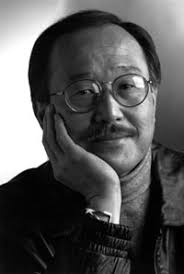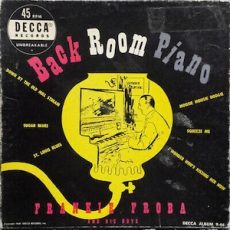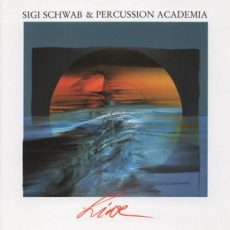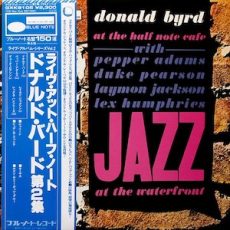
Jazz Poems
THE JOURNEY
Miles was waiting on the dock,his trumpet in a paper bag.
Lady was cold—
wind lashed the gardenias
I stole for her hair.
We were shabby, the three of us.
No one was coming so I started to row.
It was hard going—
stagnant, meandering…
The city moaned and smoldered.
Tin cans on the banks like shackles…
To be discovered, in the open…
But Miles took out his horn
and played.
Lady sang. A slow traditional blues. The current caught us— horn, voice, oar stroking water… I don’t know how long we floated— our craft so full of music, the night so full of stars. When I awoke we were entering an ocean, sun low on water warm as a throat, gold as a trumpet. We wept. Then soared in a spiritual. Never have I been so happy. LAWSON FUSAO INADAMore Posts: book,classic,collectible,history,jazz,library,poet

Daily Dose Of Jazz…
Frank Froeba was born August 6, 1907 in New Orleans, Louisiana. While still in his teens he held jobs in the bands of Johnny Wiggs and John Tobin. By the age of 17 he played with Johnny de Droit in New York City in 1924-1925, then led his own band in Atlantic City, New Jersey.
In the latter half of the decade Frank moonlighted in other dance ensembles. He recorded with Jack Purvis in 1930 and with Jack Bland in 1932, then worked with Benny Goodman from 1933 to 1935. This was followed in 1935 to 1944 where he led his own band and played on recordings for Columbia and Decca. Among his sidemen were Bunny Berigan, Jack Purvis, Bobby Hackett and Joe Marsala.
He was a house pianist for Decca in the 1930s and 1940s, playing behind Bob Howard and Lil Armstrong, among others. In 1955, he moved to Miami, Florida and performed as Frank Froba, moving more into popular performance.
One of his more popular tracks, Jumpin’ Jive, which he co-wrote with Cab Calloway. It was recorded by Joe Jackson on his Joe Jackson’s Jumpin’ Jive album.
Pianist and bandleader Frank Froeba died on February 16, 1981 in Miami.
More Posts: bandleader,history,instrumental,jazz,music,piano

Daily Dose Of Jazz
Siegfried “Sigi” Schwab was born in Ludwigshafen, Rhineland-Palatinate, Germany on August 5, 1940. He played in a wide variety of styles, including baroque and jazz. He played in German groups like Et Cetera with pianist Wolfgang Dauner, bassist Eberhard Weber, and drummers Fred Braceful and Roland Wittig.
With Embryo he was joined by drummer and percussionist Christian Burchard, Mal Waldron on piano, and bassist Dave King, and with percussionist Ramesh Shotham. He played with the Diabelli Trio, Peter Horton, Freddie Santiago, Guillermo Marchena, and Andreas Keller.
In 1980 he played with flutist Chris Hinze at the 5th North Sea Jazz Festival. In addition, Schwab has also published several books about various guitar playing styles. He was a teacher, and performed on more than 15,000 recordings for film, television, and as an accompanist to various artists.
Sigi Schwab, who recorded twenty-eight albums as a leader and died after a long illness on January 11, 2024 at the age of 83 in Munich, Bavaria, Germany.
More Posts: bandleader,guitar,history,instrumental,jazz,music

Requisites
Donald Byrd at The Half Note Café, Volume 2 | By Eddie Carter
I enjoyed listening to the first set of Donald Byrd at The Half Note Café so much that I decided to hear the second set as well, which inspired this morning’s discussion. So, as the quintet makes their way back to the stage, let’s all sit back in our seats to enjoy Donald Byrd at The Half Note Café, Volume 2 (Blue Note BLP 4061/BST 84061). Donald Byrd is on trumpet, Pepper Adams is on baritone sax, Duke Pearson is on piano, Laymon Jackson is on bass, and Lex Humphries is on the drums. My copy is the King Record Company Japanese Stereo reissue (Blue Note BST 84061 – GYK-8105).
The rhythm section lays the foundation to begin Jeannine by Duke Pearson with their introduction ahead of the front line’s opening chorus. Donald lights the first solo like a shining beacon. Pepper succeeds him with a briskly exciting performance; then Duke keeps your foot tapping with swinging precision ahead of the ensemble’s closing chorus and trio ending softly. The leader then introduces the group’s theme, Pure D. Funk, before leading the trio through the bluesy theme. Pepper is up first with a relaxing interpretation. Duke has a very fine spot next, and then Donald is as smooth as Tennessee Whiskey preceding the group’s reprise and climax.
Side Two starts with Lex’s percussive introduction to the quintet’s medium melody of Donald’s second tune, Kimyas. Pepper swings easily in an impressive opening statement. Donald follows with another equally blissful gem. Duke completes the solos at a leisurely pace anchored by Laymon and Lex until the quintet’s ending theme. When Sonny Gets Blue by Marvin Fisher and Jack Segal opens with the front line delivering a very pretty opening chorus. Duke gets the song’s only solo and delivers a wonderful expression of incredible beauty and solace, leading to the quintet’s theme restatement. Donald ends the evening by thanking the crowd for being a receptive audience.
Alfred Lion produced this live date, and Rudy Van Gelder was the recording engineer. The sound quality possesses a top-notch soundstage that truly makes you feel like you’re right there in the Half Note Café audience. King Record Company has beautifully remastered the original mono tapes, enhancing the experience. If you’re new to the music of Donald Byrd or only know of his later ’70s jazz-funk releases, I invite you to check out Donald Byrd at The Half Note Café, Volume 2, on your next record hunt. Like its companion, Volume 1, the musicians are wonderful. The music has stood the test of time and both albums are excellent documents of a live jazz performance the listener can revisit anytime!

More Posts: choice,classic,collectible,collector,history,instrumental,jazz,music,trumpet

Daily Dose Of Jazz…
Floyd Maurice “Stumpy” Brady was born on August 4, 1910 in Brownsville, Pennsylvania. At the end of the 1920s he performed and recorded with Zack Whyte’s Chocolate Beau Brummels before touring with Al Sears. During the next decade he played with Andy Kirk in New York, recorded with Blanche Calloway, and returned briefly to Whyte’s band in 1933.
He replaced Ed Cuffee in McKinney’s Cotton Pickers, and then performed and recorded with Claude Hopkins from 1936 to 1938 and Teddy Wilson from 1939 to 1940. As a member of the Lucky Millinder orchestra, Stumpy played a solo while accompanying Sister Rosetta Tharpe in the soundie Lonesome Road in 1941.
Other musicians and bandleaders he worked with include Al Sears, Count Basie, Joe Guy touring with Billie Holiday in 1945, Jay McShann, Fletcher Henderson, Roy Eldridge, and Cat Anderson. After a period of inactivity in the 1950s, Brady resumed playing in the 1960s with Slide Hampton’s band, Luckey Roberts’s orchestra, and Edgar Battle’s big band.
Trombonist Stumpy Brady died on February 11, 1998.
More Posts: history,instrumental,jazz,music,trombone



